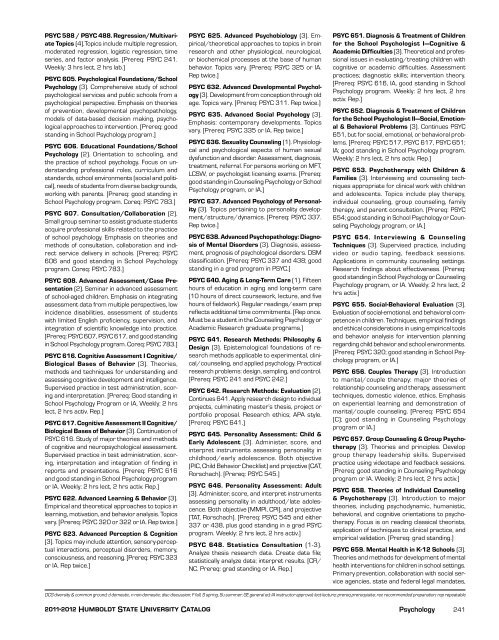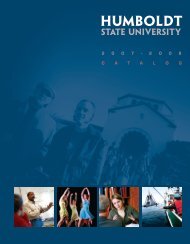2011-12 Academic Year - Bad Request - Humboldt State University
2011-12 Academic Year - Bad Request - Humboldt State University
2011-12 Academic Year - Bad Request - Humboldt State University
You also want an ePaper? Increase the reach of your titles
YUMPU automatically turns print PDFs into web optimized ePapers that Google loves.
PSYC 588 / PSYC 488. Regression/Multivariate<br />
Topics (4).Topics include multiple regression,<br />
moderated regression, logistic regression, time<br />
series, and factor analysis. [Prereq: PSYC 241.<br />
Weekly: 3 hrs lect, 2 hrs lab.]<br />
PSYC 605. Psychological Foundations/School<br />
Psychology (3). Comprehensive study of school<br />
psychological services and public schools from a<br />
psychological perspective. Emphasis on theories<br />
of prevention, developmental psychopathology,<br />
models of data-based decision making, psychological<br />
approaches to intervention. [Prereq: good<br />
standing in School Psychology program.]<br />
PSYC 606. Educational Foundations/School<br />
Psychology (2). Orientation to schooling, and<br />
the practice of school psychology. Focus on understanding<br />
professional roles, curriculum and<br />
standards, school environments (social and political),<br />
needs of students from diverse backgrounds,<br />
working with parents. [Prereq: good standing in<br />
School Psychology pro gram. Coreq: PSYC 783.]<br />
PSYC 607. Consultation/Collaboration (2).<br />
Small group seminar to assist graduate students<br />
acquire professional skills related to the practice<br />
of school psychology. Emphasis on theories and<br />
methods of consultation, collaboration and indirect<br />
service delivery in schools. [Prereq: PSYC<br />
606 and good standing in School Psychology<br />
program. Coreq: PSYC 783.]<br />
PSYC 608. Advanced Assessment/Case Presentation<br />
(2). Seminar in advanced assessment<br />
of school-aged children. Emphasis on integrating<br />
assessment data from multiple perspectives, low<br />
incidence disabilities, assessment of students<br />
with limited English proficiency, supervision, and<br />
integration of scientific knowledge into practice.<br />
[Prereq: PSYC 607, PSYC 617, and good standing<br />
in School Psychology program. Coreq: PSYC 783.]<br />
PSYC 616. Cognitive Assessment I Cognitive/<br />
Biological Bases of Behavior (3). Theories,<br />
methods and techniques for understanding and<br />
assessing cognitive development and intelligence.<br />
Supervised practice in test administration, scoring<br />
and interpretation. [Prereq: Good standing in<br />
School Psychology Program or IA, Weekly: 2 hrs<br />
lect, 2 hrs activ. Rep.]<br />
PSYC 617. Cognitive Assessment II Cognitive/<br />
Biological Bases of Behavior (3). Continuation of<br />
PSYC 616. Study of major theories and methods<br />
of cognitive and neuropsychological assessment.<br />
Supervised practice in test administration, scoring,<br />
interpretation and integration of finding in<br />
reports and presentations. [Prereq: PSYC 616<br />
and good standing in School Psychology program<br />
or IA. Weekly: 2 hrs lect, 2 hrs activ. Rep.]<br />
PSYC 622. Advanced Learning & Behavior (3).<br />
Empirical and theoretical approaches to topics in<br />
learning, motivation, and behavior analysis. Topics<br />
vary. [Prereq: PSYC 320 or 322 or IA. Rep twice.]<br />
PSYC 623. Advanced Perception & Cognition<br />
(3). Topics may include attention, sensory-perceptual<br />
interactions, perceptual disorders, memory,<br />
consciousness, and reasoning. [Prereq: PSYC 323<br />
or IA. Rep twice.]<br />
PSYC 625. Advanced Psychobiology (3). Empirical/theoretical<br />
approaches to topics in brain<br />
research and other physiological, neurological,<br />
or biochemical processes at the base of human<br />
behavior. Topics vary. [Prereq: PSYC 325 or IA.<br />
Rep twice.]<br />
PSYC 632. Advanced Developmental Psychology<br />
(3). Development from conception through old<br />
age. Topics vary. [Prereq: PSYC 311. Rep twice.]<br />
PSYC 635. Advanced Social Psychology (3).<br />
Emphasis: contemporary developments. Topics<br />
vary. [Prereq: PSYC 335 or IA. Rep twice.]<br />
PSYC 636. Sexuality Counseling (1). Physiological<br />
and psychological aspects of human sexual<br />
dysfunction and disorder. Assessment, diagnosis,<br />
treatment, referral. For persons working on MFT,<br />
LCSW, or psychologist licensing exams. [Prereq:<br />
good standing in Counseling Psychology or School<br />
Psychology program, or IA.]<br />
PSYC 637. Advanced Psychology of Personality<br />
(3). Topics pertaining to personality development/structure/dynamics.<br />
[Prereq: PSYC 337.<br />
Rep twice.]<br />
PSYC 638. Advanced Psychopathology: Diagnosis<br />
of Mental Disorders (3). Diagnosis, assessment,<br />
prognosis of psychological disorders. DSM<br />
classification. [Prereq: PSYC 337 and 438; good<br />
standing in a grad program in PSYC.]<br />
PSYC 640. Aging & Long-Term Care (1). Fifteen<br />
hours of education in aging and long-term care<br />
(10 hours of direct coursework, lecture, and five<br />
hours of fieldwork). Regular readings/exam prep<br />
reflects additional time commitments. [Rep once.<br />
Must be a student in the Counseling Psychology or<br />
<strong>Academic</strong> Research graduate programs.]<br />
PSYC 641. Research Methods: Philosophy &<br />
Design (3). Epistemological foundations of research<br />
methods applicable to experimental, clinical/counseling,<br />
and applied psychology. Practical<br />
research problems: design, sampling, and control.<br />
[Prereq: PSYC 241 and PSYC 242.]<br />
PSYC 642. Research Methods: Evaluation (2).<br />
Continues 641. Apply research design to individual<br />
projects, culminating master’s thesis, project or<br />
portfolio proposal. Research ethics; APA style.<br />
[Prereq: PSYC 641.]<br />
PSYC 645. Personality Assessment: Child &<br />
Early Adolescent (3). Administer, score, and<br />
interpret instruments assessing personality in<br />
childhood/early adolescence. Both objective<br />
(PIC, Child Behavior Checklist) and projective (CAT,<br />
Rorschach). [Prereq: PSYC 545.]<br />
PSYC 646. Personality Assessment: Adult<br />
(3). Administer, score, and interpret instruments<br />
assessing personality in adulthood/late adolescence.<br />
Both objective (MMPI, CPI), and projective<br />
(TAT, Rorschach). [Prereq: PSYC 545 and either<br />
337 or 438, plus good standing in a grad PSYC<br />
program. Weekly: 2 hrs lect, 2 hrs activ.]<br />
PSYC 648. Statistics Consultation (1-3).<br />
Analyze thesis research data. Create data file;<br />
statis tically analyze data; interpret results. [CR/<br />
NC. Prereq: grad standing or IA. Rep.]<br />
PSYC 651. Diagnosis & Treatment of Children<br />
for the School Psychologist I—Cognitive &<br />
<strong>Academic</strong> Difficulties (3). Theoretical and professional<br />
issues in evaluating/treating children with<br />
cognitive or academic difficulties. Assess ment<br />
practices; diagnostic skills; intervention theory.<br />
[Prereq: PSYC 616, IA, good standing in School<br />
Psychology program. Weekly: 2 hrs lect, 2 hrs<br />
activ. Rep.]<br />
PSYC 652. Diagnosis & Treatment of Children<br />
for the School Psychologist II—Social, Emotional<br />
& Behavioral Problems (3). Continues PSYC<br />
651, but for social, emotional, or behavioral problems.<br />
[Prereq: PSYC 517, PSYC 617, PSYC 651;<br />
IA; good standing in School Psychology program.<br />
Weekly: 2 hrs lect, 2 hrs activ. Rep.]<br />
PSYC 653. Psychotherapy with Children &<br />
Families (3). Interviewing and counseling techniques<br />
appropriate for clinical work with children<br />
and adolescents. Topics include play therapy,<br />
individual counseling, group counseling, family<br />
therapy, and parent consultation. [Prereq: PSYC<br />
654; good standing in School Psychology or Counseling<br />
Psychology program, or IA.]<br />
PSYC 654. Interviewing & Counseling<br />
Techniques (3). Supervised practice, including<br />
video or audio taping, feedback sessions.<br />
Applications in community counseling settings.<br />
Research findings about effectiveness. [Prereq:<br />
good standing in School Psychology or Counseling<br />
Psychology program, or IA. Weekly: 2 hrs lect, 2<br />
hrs activ.]<br />
PSYC 655. Social-Behavioral Evaluation (3).<br />
Evaluation of social-emotional, and behavioral competence<br />
in children. Techniques, empirical findings<br />
and ethical considerations in using empirical tools<br />
and behavior analysis for intervention planning<br />
regarding child behavior and school environments.<br />
[Prereq: PSYC 320; good standing in School Psychology<br />
program, or IA.]<br />
PSYC 656. Couples Therapy (3). Introduction<br />
to marital/couple therapy: major theories of<br />
relationship counseling and therapy, assessment<br />
techniques, domestic violence, ethics. Emphasis<br />
on experiential learning and demonstration of<br />
marital/couple counseling. [Prereq: PSYC 654<br />
(C); good standing in Counseling Psychology<br />
program or IA.]<br />
PSYC 657. Group Counseling & Group Psychotherapy<br />
(3). Theories and principles. Develop<br />
group therapy leadership skills. Supervised<br />
practice using videotape and feedback sessions.<br />
[Prereq: good standing in Counseling Psychology<br />
program or IA. Weekly: 2 hrs lect, 2 hrs activ.]<br />
PSYC 658. Theories of Individual Counseling<br />
& Psychotherapy (3). Introduction to major<br />
theories, including psychodynamic, humanistic,<br />
behavioral, and cognitive orientations to psychotherapy.<br />
Focus is on reading classical theorists,<br />
application of techniques to clinical practice, and<br />
empirical validation. [Prereq: grad standing.]<br />
PSYC 659. Mental Health in K-<strong>12</strong> Schools (3).<br />
Theories and methods for development of mental<br />
health interventions for children in school settings.<br />
Primary prevention, collaboration with social service<br />
agencies, state and federal legal mandates,<br />
DCG diversity & common ground; d domestic, n non-domestic; disc discussion; F fall, S spring, Su summer; GE general ed; IA instructor approval; lect lecture; prereq prerequisite; rec recommended preparation; rep repeatable<br />
<strong>2011</strong>-20<strong>12</strong> <strong>Humboldt</strong> <strong>State</strong> <strong>University</strong> Catalog Psychology<br />
241

















